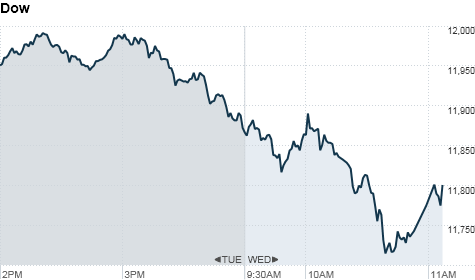NEW YORK (CNNMoney) -- Stocks turned lower Wednesday, led by energy shares, as economic fears continued to push investors into safe havens such as bonds and gold.
A jobs report that showed planned layoffs hitting a 16-month high only served to highlight the economic worries.
"You've seen economic number after number come in weaker than expected -- and that's much more to blame for the recent sell-off than the Washington debt ceiling drama," said Michael James, senior equity trader at Wedbush Morgan Securities.
The Dow Jones industrial average (INDU) dropped 70 points, or 0.6%; the S&P 500 (SPX) was down 6 points, or 0.4%; and the Nasdaq Composite (COMP) sank 7 points, or 0.3%. Both the S&P 500 and the Nasdaq have now wiped out all of their gains for the year.
Caterpillar (CAT, Fortune 500), Boeing (BA, Fortune 500) and Chevron (CVX, Fortune 500) were the biggest drags on the blue chip index, falling more than 1.5% each. Exxon Mobil (XOM, Fortune 500) was also down more than 1% and oil prices slipped nearly 2% to $92.07 a barrel.
Traders said that the late-morning sell off was fueled in part by a technical breakdown in the market. Once the S&P 500 passed through the crucial 1,250 mark, it triggered a broader sell off in the Dow and Nasdaq.
U.S. stocks plunged Tuesday, as fears about the weak U.S. economy were fueled by another disappointing economic report.
"It's been this accumulation of bad economic data -- durable goods, last week's Beige Book commentary, Monday's ISM data -- that continues to force people to sell stocks," James said.
Tuesday's grim personal spending report sparked the 8th consecutive daily decline for the Dow -- a losing streak not seen since October 2008, when the financial system was in the depths of the crisis. With Wednesday's rout, the Dow is now on pace to make it 9. And that would be the longest losing streak since 1978.
The nervousness is prompting investors to seek out some safety in bonds and gold. The yield on the 10-year Treasury note hit 2.6% -- its lowest level since early November.
Gold prices, meanwhile, surged to a fresh intraday record high of $1,675.90 an ounce, backing off to $1,672.50.
Economy: The number of planned job cuts surged to a 16-month high in July -- rising 60% in July to 66,414 from June's 41,432, according to outplacement consulting firm Challenger, Gray & Christmas.
The ADP private employment report presented a more positive picture of the job market. The payroll processing firm said the private sector gained 114,000 in July, beating expectations. Economists had expected the private sector to have hired 100,000 fresh workers in July.
All of that came ahead of Friday's report, which is expected to show that the U.S. economy created 75,000 jobs in July, according to a consensus of 16 economists surveyed by CNNMoney.com. Counting only the private sector, the forecast is for a gain of 99,000 jobs.
In June, the economy added a paltry 18,000 jobs. The unemployment rate is expected to hold steady at 9.2%.
In other economic data, the Institute for Supply Management's service sector index fell to a reading of 52.7 -- worse than the 53.7 reading that economists had hoped for, but still indicating expansion in the sector. In addition, the Commerce Department said June factory orders fell 0.8%, which was slightly better than the 1% decline expected by economists.
America's Debt Crisis: Investors remain cautious as questions about the economic recovery and the United States' pristine credit rating linger.
Fitch Ratings and Moody's Investors Services confirmed the nation's AAA status Tuesday, following a resolution to raise the debt ceiling and cut fiscal spending. But Standard & Poor's has not yet weighed in on the country's debt rating, after putting it on negative watch last month.
Does a downgrade even matter?
Companies: Time Warner (TWX, Fortune 500), the media company and parent to CNNMoney, beat earnings expectations .Shares fell 3%.
Time Warner reported net income of $638 million, or 59 cents per share, and revenue of $7 billion. The media company was expected to report a profit of 56 cents per share and revenue of $6.8 billion.
Dunkin' Brands (DNKN) reported its first earnings since going public last week. The parent of the Dunkin' Donuts chain reported that global sales jumped 7% in the second quarter, compared to the year-earlier quarter, while same-store sales in the United States edged up about 3%.
But the growth in sales failed to lift profits. Net income was practically unchanged at $17.2 million for the quarter. The company's stock slid about 2%.
Shares of Open Table (OPEN) dropped 9% after the online provider of restaurant reservations disappointed investors by missing sales estimates.
MasterCard (MA, Fortune 500) shares rose 8% after the company posted a 33% increase in quarterly profits well ahead of analyts expectations.
World markets: Fears about a slowing global economy triggered losses in world markets.
European stocks were all lower in late-day trading. Britain's FTSE 100 tumbled 2.5%, the DAX in Germany fell 2.7% and France's CAC 40 decreased 1.6%.
Asian markets ended in the red. The Shanghai Composite slipped 0.3%, the Hang Seng in Hong Kong dropped 1.9% and Japan's Nikkei tumbled 2.1%.
Currencies: The dollar was lower against the euro, the Japanese yen and British pound.
First Published: August 3, 2011: 9:51 AM ET
Wednesday, August 3, 2011
Market Report - Aug. 3, 2011 - CNNMoney
via money.cnn.com
Subscribe to:
Post Comments (Atom)

No comments:
Post a Comment